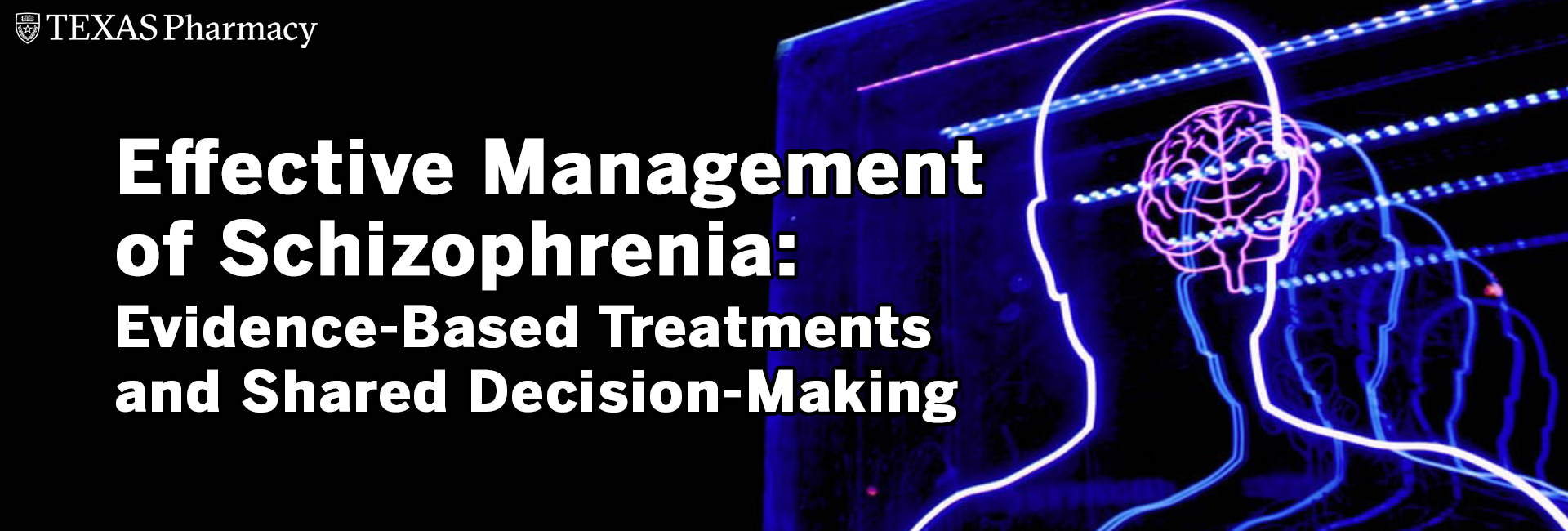

|
Scientific Chair
|
|
|
Stephen R. Saklad, PharmD, BCPP
Director and Clinical Professor
Psychiatric Pharmacy Program
The University of Texas at Austin College of Pharmacy UT Health San Antonio
|
|
|
Course Faculty
|
|
|
Leslie Citrome, MD, MPH
Clinical Professor
Psychiatry and Behavioral Sciences
New York Medical College
|
Amanda J. Simonton, MSN, RN, PMHNP-BC
School of Nursing,The University of Texas at Austin
Psychiatric-Mental Health Nurse Practitioner
CARMAhealth
|
|
Cristyn Cordova, MSW, LCSW-S
Director of Social Work
Austin State Hospital
|
Dawn I. Velligan, Ph. D.
Professor
Department of Psychiatry
UT Health Science Center at San Antonio
|
|
Brendon Hogan, PharmD, BCPP
Clinical Pharmacy Manager
Mental Health and Pain
Central Texas Veterans Health Care System
|
|
Faculty Financial Disclosures
Conflict Resolution
The University of Texas at Austin Continuing Pharmacy Education (UT CPE) requires instructors, planners, and other individuals who are in a position to control the content of this activity to disclose (self/spouse) all relevant financial relationships with commercial interests that are related to the content of this activity. For faculty members who reported relevant financial relationships (Saklad, Velligan, Citrome), an additional peer-review of their activity content was performed by two individuals who have field/topic expertise and no financial disclosures or conflicts of interest. The peer reviews concluded that all presentation/program content that has been developed by faculty members who disclosed relevant financial relationships (named above) is evidence-based, balanced, and free from commercial bias.
Peer Reviews
Tawny Smith, PharmD, BCPP
Associate Professor of Psychiatry
The University of Texas at Austin Dell Medical School
Target Audience
This activity is intended for pharmacists, physicians, psychiatrists, advance practice nurses, physician assistants, psychologists, and social workers seeking an advanced level of knowledge/skills regarding the management of schizophrenia. This program offers CPE, CME, and Social Work credit.
 |
The University of Texas at Austin College of Pharmacy is accredited by the Accreditation Council for Pharmacy Education as a provider of continuing pharmacy education. The ONLINE modules are accredited up to 4.25 CE hours and the LIVE workshops are accredited for a total of 3.0 CE hours.
|

|
Instructions
|
| Activity Details |

|
Stephen R. Saklad, PharmD, BCPP, Pharm.D., BCPP
|
|
Instructions
|
| Activity Details |

|
Amanda Simonton, MSN, RN, PMHNP-BC, MSN, RN, PMHNP-BC
Brief Bio : Amanda J. Simonton, PhD, APRN, PMHNP-BC is a Psychiatric Mental Health Nurse Practitioner in Austin, TX. She works at CARMAhealth, an outpatient clinic that provides primary and psychiatric care to individuals with dual-diagnoses – substance use and psychiatric disorders |
|
Instructions
|
| Activity Details |
|
Cristyn Cordova, MSW, LCSW-S
|
|
Instructions
|
| Activity Details |

|
Dawn I. Velligan, Ph.D.
|
|
Instructions
|
| Activity Details |
|
Leslie Citrome, MD, MPH
|
|
Activity Details
|
|
This session is a recording of the live webinar that took place on October 20, 2020. It is available for Home Study credit to those who did not already attend the live webinar on October 20. Instructions are listed down below.
|

|
Brendon Hogan, PharmD, BCPP
|

|
Stephen R. Saklad, PharmD, BCPP, Pharm.D., BCPP
|
|
Activity Details
|
|
This session is a recording of the live webinar that took place on December 3, 2020. It is available for Home Study credit to those who did not already attend the live webinar on December 3. Instructions are listed down below.
|

|
Dawn I. Velligan, Ph.D.
|

|
Stephen R. Saklad, PharmD, BCPP, Pharm.D., BCPP
|
|
Activity Details
|
|
This session is a recording of the live webinar that took place on January 11, 2021. It is available for Home Study credit to those who did not already attend the live webinar on January 11. Instructions are listed down below.
|

|
Brendon Hogan, PharmD, BCPP
|

|
Stephen R. Saklad, PharmD, BCPP, Pharm.D., BCPP
|